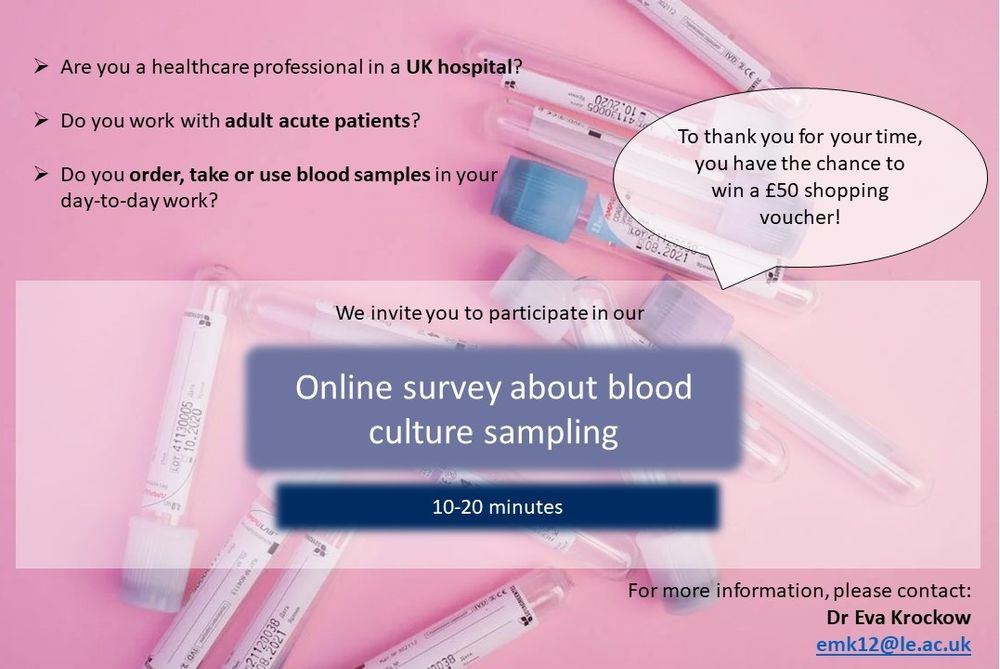Validate User
New research by @evakrockow.bsky.social et al. finds #AMR messages too technical and unclear
We need clearer, more relatable comms to drive change:
doi.org/10.1093/jaca...
@evakrockow.bsky.social @bsacandjac.bsky.social #JACAMRNews #IDSky
01.09.2025 10:02 — 👍 4 🔁 3 💬 0 📌 0

Why antibiotics are like fossil fuels
They helped create the modern world but are dangerously overused. How can we harness them sustainably?
💊Antibiotics are our invisible infrastructure—like fossil fuels, we’re burning through them. 🔥
👏Refreshing metaphor, which links in with my own ongoing work!
#AMR #HealthComms
www.theguardian.com/books/2025/a...
20.08.2025 08:44 — 👍 0 🔁 0 💬 0 📌 0
🎓 Big decisions this A-level week? Here are 5 expert tips to guide you through Clearing:
1️⃣ Put things in perspective
2️⃣ Use simple rules of thumb
3️⃣ Trust your gut
4️⃣ Seek second opinions
5️⃣ Stay calm—you’ve got this 💪
#Clearing2025 #ALevelResults
@uniofleicester.bsky.social
🔗shorturl.at/i4L2Q
12.08.2025 08:48 — 👍 0 🔁 0 💬 1 📌 0

Well done to our PhD student Meghann Jones for her excellent presentation on antidepressant prescribing choices in primary care at today's PGR conference. 👏
17.06.2025 10:15 — 👍 2 🔁 0 💬 0 📌 0


Great workshop today on our research into #antibioticresistance communication, co-presented with @sam-mkumbuzi.bsky.social (University of Cape Town). Big thanks to everyone for the insightful comments and suggestions - great to keep conversations going over lunch! #AMR #RiskCommunication
10.06.2025 13:45 — 👍 2 🔁 0 💬 1 📌 0

Fantastic to see @debbamber.bsky.social present ethnographic data on behavioural and social factors impacting blood culture sampling at the annual ABC Workshop. Great work as part of our NIHR-funded iSAMPLE project!
15.05.2025 13:28 — 👍 7 🔁 1 💬 0 📌 0

Excellent talk by @miroslavsirota.bsky.social arguing that 'wicked learning environments' create misguided intuitions and expectations about antibiotics.
15.05.2025 11:44 — 👍 6 🔁 1 💬 1 📌 0

Eva M. Krockow (presenter), Samkele Mkumbuzi, David Jenkins, Carolyn Tarrant, Marc Mendelson
Effective risk communication is paramount to addressing the global threat of antimicrobial resistance (AMR). A key prerequisite to successful communication is the use of appropriate health risk messages. Previous language has been criticised as abstract and inconsistent. This study aimed to explore perceptions and risk communication needs of patients and healthcare professionals to lay the groundwork for the development of new, improved global health messages about AMR.
Across the UK and South Africa, we recruited patients with ... multidrug-resistant infections and frontline prescribers of antibiotics to discuss existing risk communication materials, explore knowledge gaps and identify needs for improved health messages .... ..., we identified key themes and mapped these against the theoretical components of the Elaboration Likelihood Model.
Participants experienced current risk communication as overly “sciency”, culturally inauthentic and “draconian”, attributing unfair blame to uninformed patients. Knowledge gaps often pertained to basic scientific principles, with patients being unaware of the existence of different types of microbes or unable to tell them apart. Doctors highlighted lack of time as a key barrier to more detailed explanations of AMR.
Overall, patients reported a lack of motivation and capability to engage with AMR messages. Drawing on the Elaboration Likelihood Model, this suggests that central processing and detailed elaboration of AMR risk information is unlikely in lay audiences. To increase persuasiveness of AMR messaging, our findings suggest the need for more engaging information materials with the power to prompt behaviour change even via a peripheral route of information processing. Messages will need to be tailored to existing knowledge levels, take into account cultural background, and communicate basic information without attributing blame.

Abstract
Objective: This study examined perceptions of current antimicrobial resistance (AMR) communications to improve future messaging, counter misinformation, and promote behaviour change. It extends previous research through focus groups with doctors and patients, analysed using the Elaboration Likelihood Model (ELM).
Methods: We held 3 focus groups (n=15) with UK patients with recent experience of AMR and 4 (n=14) with hospital doctors experienced in AMR treatment and communication. Semi-structured questions explored perceptions of public AMR messaging. Data were analysed using reflexive thematic analysis.
Results: Most participants found public AMR information difficult to access, overly technical, and unclear. They struggled to find personal and cultural relevance, described the tone as punitive and highlighted contradictory advice (e.g., discouraging antibiotic use while recommending full course completion), undermining argument quality. Some appreciated buzzwords like ‘superbugs’, but most felt that messages lacked impact and “punch”. When viewed through the ELM, the problematic tone and lack of personalisation reduced recipients’ motivation. The lack of readily available, clear information hindered their ability to engage in central route processing, reducing the likelihood of elaboration and subsequent persuasion. Attitude change from peripheral route information processing was equally questionable given the lack of persuasive message cues.
Conclusions: Current AMR messaging is insufficient and risk communication theory could highlight areas for improvement. Our ELM analysis suggests a need to enhance motivation, capability, and argument quality while adding persuasive, peripheral cues. Personally and culturally tailored messages with a positive, solution-focused tone and simplified, engaging language may boost impact and promote lasting attitude change.
First, @evakrockow.bsky.social et al.
"...Public and professional views on #risk communication about #antimicrobialResistance across the #UK and #SouthAfrica"
Hurdles:
- patient awareness, motivation, capacity to understand
- clinician's scarce time
🔓 Preprint about UK data osf.io/preprints/ps...
15.05.2025 10:56 — 👍 2 🔁 1 💬 1 📌 0

Finally I get to meet @cortneyprice.bsky.social in person! Inspiring and hugely engaging talk on behavioural science in #AMR, touching on experiential strategies for policy influence.
15.05.2025 09:21 — 👍 5 🔁 2 💬 0 📌 0

Excited to be in Vienna for this year's Behavioural Insights & Antimicrobial Resistance Workshop by the ABC network. Looking forward to a stimulating day and interesting discussions! Thanks for hosting us,
@robertboehm.bsky.social!
#AMR
#antibioticresistance
15.05.2025 07:40 — 👍 15 🔁 4 💬 1 📌 0
Scoping review of barriers and facilitators of optimal blood culture sampling for patients with severe infection highlights gaps in the evidence:
doi.org/10.1093/jaca...
@debbamber.bsky.social @evakrockow.bsky.social @bsacandjac.bsky.social #JACAMRNews
10.04.2025 10:00 — 👍 3 🔁 1 💬 1 📌 1
OSF
💬 Why Antimicrobial Resistance Messaging Fails: Qualitative Insights Through the Elaboration Likelihood Model
In this preprint, we examine qualitative data from UK patients & doctors through the Elaboration Likelihood model.
shorturl.at/RRTlU
07.04.2025 09:18 — 👍 1 🔁 0 💬 0 📌 0

💉COVID-19 vaccine decision-making and the role of institutions across the pandemic in UK Black African and Black Caribbean communities
We explored #COVID19 vaccination attitudes & found evidence for enduring institutional mistrust shorturl.at/TLrTf
07.04.2025 09:18 — 👍 1 🔁 0 💬 1 📌 0

📣 Risk communication about antimicrobial resistance: A content analysis of metaphor use in global public discourse
We show that #AMR discourse is rife with metaphor, but argue that conventional phrases like "war against superbugs" won't change behaviour.
shorturl.at/IttiS
07.04.2025 09:18 — 👍 1 🔁 0 💬 1 📌 0
It's publication day! 📄 By some odd coincidence, I had two papers and one preprint published in one day (whoop whoop)! Here's a brief overview (a 🧵)
Thanks to my brilliant co-authors, incl. Carolyn Tarrant,
@marcmendelson.bsky.social, & Stephen Flusberg!
07.04.2025 09:18 — 👍 4 🔁 1 💬 2 📌 0
And another rapid unscheduled metaphor! blogs.nottingham.ac.uk/makingscienc...
07.03.2025 10:44 — 👍 5 🔁 2 💬 0 📌 0

Very excited for today's invited speaker. @olgakos.bsky.social will be sharing her work on algorithms to support medical decision making.
06.03.2025 13:04 — 👍 1 🔁 1 💬 0 📌 0
Can't wait to see what you come up with!
05.03.2025 20:55 — 👍 0 🔁 0 💬 0 📌 0

Do you regularly take or order bloods for acute hospital patients? We want to hear about your experiences and views in a short online survey!
redcap.lcbru.le.ac.uk/surveys/?s=F...
03.02.2025 09:49 — 👍 2 🔁 2 💬 0 📌 2


I've had a fantastic and hugely productive research visit to South Africa. One highlight was a creative session on visualising #AMR metaphors facilitated by the wonderful Natalie Schellack. Thank you for having me - it was so much fun!
24.01.2025 12:18 — 👍 2 🔁 0 💬 0 📌 0
I am still looking for more participants for my 1-hour focus group study. Please share widely!
#antimicrobialresistance
09.01.2025 12:25 — 👍 0 🔁 0 💬 0 📌 0
Social scientist. Co-Director Centre for Healthcare Innovation, Policy & Management, University of Leicester School of Business. Editor-in-Chief Journal of Health Services Research & Policy https://journals.sagepub.com/home/HSR
Minimising AMR is an initiative of CSIRO and partners.
Visit www.amr-action.au for information on how we can mitigate the impact of antimicrobial resistance in Australia and beyond.
Health services researcher, SAPPHIRE, University of Leicester | Currently researching in acute emergency care | Interested in optimising patient & parent experience, patient safety, maternal & infant healthcare, qualitative research methods, PPIE
Psychologist | PhD student at University of Vienna | Health decision making in vaccination and antibiotics | she/they 🏳️🌈
I study how to improve decisions and well-being at @GeisingerCollege.bsky.social.
🎓 gScholar: shorturl.at/uBDPW
▶️ youtube.com/@ByrdNick
👨💻 psychologytoday.com/us/blog/upon-reflection
📓 byrdnick.com/blog
🎙️ byrdnick.com/pod
Head of Department of Social and Behavioural Medicine UPJS Kosice | Immediate Past President EUPHA | President of the EPH Conference Foundation | Executive Director SAVEZ
#PublicHealth
#BehaviouralScience
University Assistant (Praedoc)/ Ph.D. candidate @univienna
Social & Economic Psych Group
antibiotic use, antimicrobial resistance
Highly indecisive know-it-all fascinated by behaviour, communication and risk | Lead for Behavioural Science @FAO | Opinions, heuristics and biases my own
Lecturer in Psychology at Uni of Leicester (based in Brum); Researcher in social determinants of mental health and socioeconomic health inequalities - how they arise, how we think about them and how to address them. LGBT+ Equalities Branch Officer
PhD Candidate at the School of Life Sciences, University of Warwick, UK. Interested in antimicrobial resistance, bioinformatics, natural products and phage biology.
Professor at the University of Essex. Judgment & decision making. Love all things risk and uncertainty with a side interest for sexism - Raising 2 girls
Postdoctoral research fellow at Institute for Climate Risk & Response, UNSW | Interested in Climate change, Judgment, Decision-making, Open Science, and rstat
Head of #Archives & #Records (inc #DigitalArchives) & Professional Lead for #HistNursing at Royal College of #Nursing. From chick to butterfly, finding my peeps
Nursing Professor Diversity & Social Justice. Culture gender, health, later intensive care nursing, stroke. Social media learning. All views are my own 🇹🇹 https://researchportal.lsbu.ac.uk/en/persons/calvin-moorley
Retired Professor of Nursing/1st UK Sickle Cell Nurse. Irish/Nigerian heritage. Love good craic, humour & music. Listen to the 8 tracks I chose on BBC Radio 4’s Desert Island Discs [4/6/2020] for my type of music! https://www.bbc.co.uk/programmes/m000jn8w
Chief Executive, the Queen's Instute of Community Nursing.
I am committed to high quality community nursing for every citizen. #protectnurse "Be at the table or you will be on the menu"
LeadNurse4Research @Moorfields
Prof. of Ophth Health & Care @UCLeye @NIHRresearch Programme Director Senior Research Leaders
@GlaucomaUK trustee
#NIHRSRL #NIHR70at70
🇹🇹




























